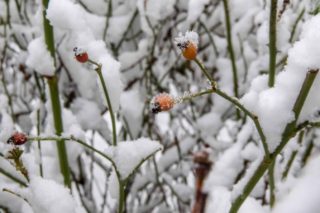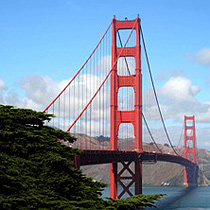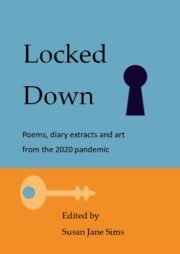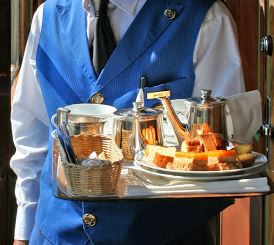
• Archive of all Poetry Space showcases
Photograph – Chris Sims
Editor- Nathan Evans
Nathan is a writer, director and performer whose work has been funded by the Arts Council,
toured with the British Council, archived in the British Film Institute and broadcast on
Channel 4. His poetry has been published by Dead Ink, Inky Needles and Manchester
Metropolitan University. His second collection, CNUT, is published by Inkandescent.
www.nathanevans.co.uk
Scroll down below poems for Nathan’s comments on the poems and links to his own work.
January
Wolf month the Saxons called it
yellow eyes at the edge of the wood,
cattle restless in the barn’s warm fug
the banshee howl of something other,
something more than the storm’s teeth
tearing at the thatch.
To the Finns it’s Tammikuu, oak moon.
each tree a glittering chandelier lit
by a frozen glare.
The Romans named it Janua, the door of the year,
a creaking hinge, coated with ice.
A cruel time to shed the old year’s furs
and teeter on the lip of a new year while
earth is still sleep-heavy, smothered under snow.
Jenna Plewes
ice cores
in the lowest shelves we read
messages from early times:
hear mammoths howl,
so long in the tooth
they ended days
in frozen mud,
were then engraved
in alabaster pages,
one layer on another until this time…
now, now the ice-book prophecies are here
in white papyri,
in frozen scripts
that all can read
in the lacunae of glaciers,
in icebergs’ thunder,
in the rush of melt-water tornadoing down
moulins & thaw-holes
deeper than whirlpools
deeper than bore-holes
here, here, when time & ice reverse themselves
and the world moans under the melt of pack ice,
drowns in the groan of brash ice
liquefying below us,
we swim in polar seas
yet find no land
to set dry feet upon…
so shall we too be lost?
so shall we too be lost
Lizzie Ballagher
Larks over Reculver
Waiting for spring’s first warm westerly,
for gold & silver light,
we turn into a bitter wind
beside a sea of steel:
head east along the path.
Landward, soil gleams
with last night’s rain,
black furrows shining, shot through
with points of green
where new wheat starts its push.
We cannot count the larks:
larks over Reculver’s flinty towers,
larks rising from the Saxon-shoreline grass
to daub their coloured carols
on the clouds, the air, the sea, the shore…
as we hike onward in a lead-grey wind,
waiting still for spring.
Lizzie Ballagher
Sumer No Longer Icumen in
Sumer is icumen in,
Lhude sing cuccu…
Springeth the wode nu
Sing cuccu! Sing cuccu!
~ thirteenth-century song
Thieves, robbers, we tag them:
Murderers of nestlings, fledglings.
Cruel, we name them
While cuckoos do call, do call to us
In the lost soft voices of wildwoods
And the wasted worlds
Of blue spring, green sumer,
Of hope for second chances
Before they too go silent,
Before sumer itself cannot be icumen in,
Before the skies go so dark
That apple & hawthorn flowers fall,
No longer bloom in orchards, hedgerows—
Before they too shall fade—
Also before the failing of all fragrant light.
Oh! It is we who are cruel.
Our great-great-grandchildren may never hear
The cuckoos’ call, the blessing of that blue-green sumer voice,
And if the cuckoo goes the way of the corncrake
Into our silent shadowlands of selfishness,
They will not know what they miss.
But you in the hazel groves shall know,
And I in among the beech woods then shall know,
And our hearts shall long lament, yes,
When we too have lost the voice to sing or call
And even when sumer
No longer is icumen in at all.
Lizzie Ballagher
Sweet Peas
Pink and mauve butterflies
sway and dip in the wind
flutter soundless
their scent so strong
a bee might buzz
with drunken abandon.
I pick some for you
to remind you of the garden
as you lie in your hospital bed.
You grasp the delicate stems
in your weathered hands,
inhale their quiet beauty
then surprise me
by turning to my brother
offering this gift to him.
Sue Wallace-Shaddad
Searching for the second magpie
Maple branches sing into green
and one bird of joy, flaunting its
zebra feathers, zips to the place
where tree meets sky.
Not a great omen – so what’s
new? You’ve learned to live with
the oneness of things, one plate,
one mug, one glass.
You turn from the window, shrug,
That old wives’ tale! – but your
eyes strain for a flash of matching
jet-bright wings.
Your ring catches the sun – with
a sorcerer’s timing, the perfect pair
strut across the grass, splendid in
full evening dress.
Kleptomaniacs, these two – gold has
done the trick. If only it were as easy
to conjure up the one person who
could change your life.
Moira Andrew
Playground
‘Ted motioned me to look at the slow uplifted faces of children in the primary school yard,
all seated on rest rugs, utterly without grief’
The Big Ship sails on the ally-ally-oh,
ally-ally-oh, the ally-ally-oh …
Our infants by the bicycle shed ride the high seas,
here near the perimeter fence
we’ve just chosen the dog’s bone,
circling, circling.
All pat the bone. All pat the …
Dong! Dong! Dong!
The headmistress’ whistle shrills. The funeral-toll. We scurry,
flatten our backs tight against the cold school-wall.
Until last year we all thought death
was a man in a long black coat with a top-hat,
but that was before one of us
didn’t return to her class on Monday,
Petronella (or was it Zelmadine?) was away.
Miss Ninnis told us, she won’t be back again.
She had pneumonia (or was it polio?).
She had passed away.
In our playground Chinese whispers told us, that’s Death.
We were preoccupied an eternal term with this new idea
of nothingness – the child disappearing act.
Her second whistle blows us free
we explode over asphalt, like dust,
take time to settle to play our circle-games again,
but soon, before the bell of the last lesson
hand holds hand holds hand –
Wife wants a child, the wife wants a child … EIEIO
Note: Quote from Sylvia Plath, Journals (Faber & Faber, 2011). I’d left the school just before the time of Percy Key’s
funeral, the subject of Plath’s journal entry; in my memory the children did not have the comfort of rugs; perhaps on Key’s
funeral day they were in the middle of a gym-session.
Julie Sampson
‘On the edge of the sky’
sitting
on the edge of the sky
dusting sand
from between my toes
perspectives shift
move out of kilter
and my eyes ache
in the blue-black light
I make out swallows
jitterbugging
beneath me
notched wings
outstretched
the tops of trees
huddling like mushrooms
ripe for picking
roads and rivers
hedges and ditches
parcelling the earth
into lots
grey rain collecting
belly-heavy
in cloud-balloons
about to burst
dizzy, I cling
to tufts of rank grass
and sea thrift
to shadows of childhood
as I search the air
for something
I didn’t know
I’d lost
Moira Andrew
Was it like this for Markham Brown?
Who was Markham Brown?
On the edge of the town
A small park borders the estuary
With a bench where folk
Rest, half-way through a gentle walk,
Look at the widening sea, and talk
About what they own
Or would like to own,
And the kids. How can it be
That what, once, they used to share
Has gone, like it was never there?
Is anything left for them here?
A plaque says Markham Brown
Loved it here. Did he sit down,
Like us, half-way through life,
Here with his wife, try to say
The things everyone wants to say
But can’t, then leave it for another day
That never came? Wanting to talk,
Finding you can’t. Did folk
Guess? Or did they see
An intimacy unknown
While an estuary’s grown
Between them.
Who was Markham Brown?
Michael Docker
Jane Goes to Godmersham Park
Head bowed against a sharp spring wind scything
off the North Downs, shabby-bonneted and ankle-booted,
you follow down the daffodil walk,
arm in arm with Edward and his wife—
oh, so well versed in the role
of poor relation, yet cheerful,
uncomplaining in your patched shawl,
neatly mended hand-me-downs.
Your eyes dart over the details of the ladies’ frocks,
the cut of the gentlemen’s coats—their scarlet uniforms.
You listen well; your ears pick up snippets
of some very different fabrics:
unvarnished tattle-tales, cross-threaded romances,
and foolish marriages contemplated for estates
or taken up in haste by empty-headed girls:
long homespun yarns & vapid platitudes.
Smiling to yourself, you take due note:
store their tales in hidden folds
of your quick-witted mind as, breathless now,
you trudge up Godmersham Hill.
Later, from the high downs’ ridge, you turn
along the pilgrim path where Chaucer once had ridden,
staring back at the sweep of carriageway
from lodge & gatehouse to the warm & redbrick welcome
of your brother’s gracious mansion
nestled by the Stour in velvet green expanses;
know you never will belong in such luxuriance…
but that, here, imagination may take root:
think, I’ll call you Mansfield Park.
Lizzie Ballagher
Editor’s Notes
January
What better way to begin a winter showcase than with a poem about that bleakest mid-
season month? Great imagery here—January as other, tearing at the edges of a new
year, as chandelier shedding light, as stripper shedding layers in plunging
temperatures.
ice cores
From snow to ice: a poem which addresses the climate crisis. In these troubled times,
we’re turning to poetry—so statistics say—perhaps as a form of consolation. This offers
none, but does offer layers of lovely imagery as prehistory’s pages unfreeze.
Larks Over Reculver
Winter begins to turn to spring: the poet captures a simple but beautiful moment as
nature jewels its base-metal with colour (but has yet to alchemise into gold and silver).
Sumer No Longer Icumen in
After spring comes summer, or not: in another thought-provoking take on climate
change, this poem begins by calling cuckoos—nature’s robbers—names, then turns on
those who may have robbed future generations of nature, of hearing the cuckoo’s call.
Sweet Peas
Summer is now in full-bloom and used as counterpoint in this quietly beautiful piece
about end-of-life: a simple situation, simply observed, that hints at complex familial
tensions between those succinct lines.
Searching for the Second Magpie
Magpies are here the thieves – in full evening dress, no less, they flaunt and strut
through this poignant poem about coming to terms with the loss of a spouse, its details
built subtly, gradually through solitary crockery and flashes of ring (wedding
presumably).
Playground
Here the loss is of a child and this poem shows us how children can process death—as
form of fancy dress, as disappearing act—quite differently to (and arguably more
successfully than) adults. The quote from Plath’s journal gives added resonance.
On the Edge of the Sky
Sometimes we lose something in childhood, only realising it much later when our
perspective is shifted – through drugs, possibly, or therapy. Here it is simply through
observing reflections in water. But how well-observed those disorienting details are.
Was it like this for Markham Brown?
Who hasn’t ever wondered whose inscription they’re sitting on? Water becomes
estuary, physically, emotionally in this poem in rhyming couplets—from which the line
breaks and conversational tone skilfully pull attention—about a couple who are out-of-
rhyme.
Jane Goes to Godmersham Park
Another walk in the park which, as well as being a well-observed historical skit, is a
timeless observation on the writer’s process and the luxuriance which imagination gives.
@nathanevansarts
As King Cnut proved, tide and time wait for no man: CNUT dives into the rising tides of geo-
political change and explores sea-changes of more personal natures.
‘CNUT is a kaleidoscopic journey through shifting landscapes, brimming with vivid imagery,
playfulness and warmth. A truly powerful work!’—KEITH JARRETT
www.inkandescent.co.uk
@InkandescentUK
trailer link—
trailer embed code—







